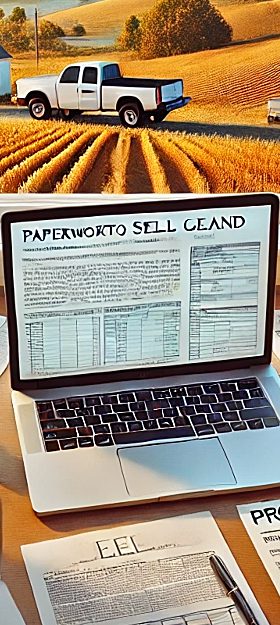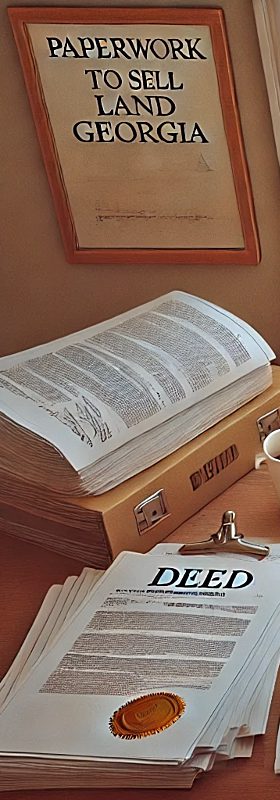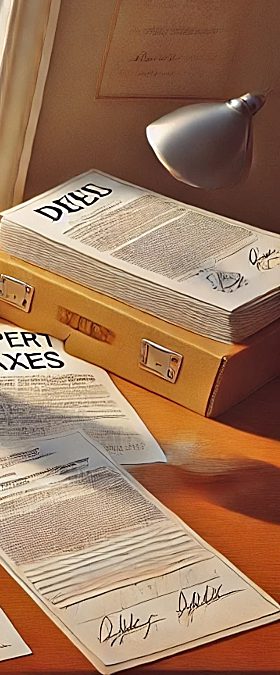
Paperwork to Sell Georgia Land: Don’t Skip These!
Selling land in Georgia might seem like a straightforward process, but it comes with a hefty amount of paperwork that can make or break your deal. Imagine getting all the way to closing, only to find out you’re missing a key document like a deed or property tax record—talk about a deal-breaker! In Georgia, failing to have the right paperwork in order can stall a sale faster than you can say “transfer tax,” which is split between buyer and seller at 0.50% of the sale price.
Not only do you need essential documents like title insurance (which typically costs between $300 and $400), but you’ll also want to make sure all your property taxes are paid up. Believe it or not, about 15% of land sales in Georgia are delayed due to outstanding property tax issues. Plus, skipping steps like a land survey could lead to future boundary disputes—something 60% of rural buyers request before even signing a contract.
So, whether you’re selling a scenic plot nestled in the rolling hills or a large expanse of farmland, having this paperwork ready can save you time, money, and legal headaches. Trust me, when closing day arrives, you’ll be glad you checked every box.

Why Having the Right Paperwork Matters
Imagine being at the closing table, buyer’s pen in hand, and realizing you’re missing an essential document. Not the best way to celebrate your big sale, right? Missing crucial paperwork can lead to costly delays, cause mistrust with buyers, and even land you in legal trouble. If you want the sale to proceed smoothly, it’s crucial to be well-prepared. Proper documentation doesn’t just facilitate the transaction; it also protects you from any legal complications that may arise down the road.
Georgia Land Sale Paperwork Checklist
Now that you know why paperwork is crucial, let’s dive into the essential documents you’ll need. Selling land in Georgia isn’t just about handing over the keys—you need to ensure that every aspect of the sale is legally binding and transparent. By securing the correct land sale documents, you’re not only protecting yourself but also building confidence with the buyer, which can speed up the closing process. Here’s your checklist for making sure the transaction is smooth and, more importantly, legally sound.
1. The Deed: Georgia’s Ownership Transfer Essential
In Georgia, the deed is the key document that transfers ownership from you to the buyer. Without it, there’s no sale. The most commonly used is the Warranty Deed, which ensures the buyer that the property is free of any legal claims, liens, or disputes. Alternatively, some sales may use a Quitclaim Deed, which provides less protection to the buyer but is often used in family or informal transactions. Be sure to work with an attorney to ensure that the deed is correctly prepared, as any mistakes could cause delays or void the sale.
2. Land Survey: Defining Boundaries
Before you sell, make sure you have an updated land survey. This document confirms the exact boundaries of the property, helping avoid future disputes about where the property begins and ends. In rural Georgia, about 60% of buyers request a survey to ensure there are no encroachments or easement issues. A precise survey not only helps protect your interests but also gives the buyer peace of mind, especially when they plan to build or make improvements on the property.
3. Purchase Agreement: Setting Terms in Stone
This contract outlines all terms and conditions of the sale, from the purchase price to contingencies. The purchase agreement binds both the buyer and the seller to the deal. In Georgia, a well-constructed agreement can avoid delays and prevent disagreements later. This document must include details such as the legal description of the land, contingencies, and deadlines to ensure both parties are fully committed. Having this document in place significantly reduces the chances of future disputes or misunderstandings.

4. Property Tax Records: Clearing Uncle Sam’s Dues
Before the sale can go through, you’ll need to ensure all property taxes are paid and provide the buyer with records. Outstanding property taxes can derail your closing faster than Atlanta traffic. According to state law, failure to clear taxes can halt 15% of real estate transactions. It’s a good idea to contact the local tax office well in advance of closing to verify that there are no unpaid taxes or liens on the property that could cause issues for the buyer.
5. Disclosure Forms: Honesty is the Best Policy
Georgia is a “buyer-beware” state, but you are still required to disclose any known latent defects that could impact the buyer’s use of the land. Disclosing drainage problems, encroachments, or zoning restrictions can save you from legal battles after the sale. It’s not just polite—it’s the law. Even though buyers are expected to perform their own due diligence, any failure to disclose significant issues that only the seller could know can still result in legal repercussions.
Additional Paperwork to Smooth the Process
Title Insurance Policy: Protecting Against Disputes
Title insurance is a safety net against any title-related issues that might come up after the sale. Most buyers will require it, and it’s recommended in almost every Georgia land transaction. It protects both the buyer and seller from any claims against the property that may arise after the sale, such as undisclosed heirs or old liens. Without title insurance, both parties are at risk of unexpected legal issues that could jeopardize the transaction.
Power of Attorney: A Handy Backup Plan
If you can’t attend the closing, a Power of Attorney (POA) can sign the documents on your behalf. This can be a lifesaver if you’re out of town or dealing with the sale remotely. Just make sure the POA is specific to the real estate transaction, and ensure it’s filed correctly to avoid confusion or delays at closing.
Navigating Legal Requirements in Georgia
Understanding Georgia Land Sale Laws
Georgia’s regulations vary depending on zoning and environmental factors. For instance, if the land includes wetlands or is subject to specific zoning laws, you’ll need to disclose that upfront. Be prepared to provide any relevant information that may affect the buyer’s plans for the property. Zoning restrictions can impact a buyer’s ability to develop or build on the land, so clarity on these laws is crucial for a smooth transaction.
Working with a Real Estate Attorney
Though it’s not a requirement, having a real estate attorney on your team can help prevent mistakes and make the process smoother, especially when dealing with complicated property issues like liens, easements, or boundary disputes. An attorney can also help review contracts, deeds, and other documents to ensure everything is in order before closing.
How to File & Finalize Your Paperwork
Recording the Deed
Once the sale is finalized, the deed must be recorded with the local county clerk’s office. This step makes the transfer of ownership official and avoids any future disputes. Failing to record the deed could cause legal problems for both the buyer and seller, and it’s one of the most important final steps in the sale process.
Closing Documents: Wrapping It All Up
At closing, you’ll sign various documents, including the closing statement, tax records, and the deed. Once these are signed, the sale is final, and the land officially belongs to the buyer. Don’t forget to review everything carefully at the closing table to ensure there are no last-minute errors that could cause delays.

Common Mistakes to Avoid When Selling Land in Georgia
Incomplete or Incorrect Deeds
Mistakes in the deed can delay or even nullify the sale. Make sure to double-check everything or hire a professional to avoid errors. Incomplete legal descriptions or missing signatures are common issues that can easily be avoided with a thorough review.
Forgetting to Pay Property Taxes
Unpaid taxes can halt your sale. Ensure everything is squared away with the local tax office well before closing. Even small tax delinquencies can cause major delays or result in penalties, which could cost you both time and money.
Failing to Disclose Property Issues
Georgia requires you to disclose any known issues that could impact the property. Transparency is key to avoiding legal trouble down the road. Be upfront about any defects or zoning restrictions to prevent future disputes that could arise after the sale.
Partnering with Bubba Land for Seamless Land Transactions
Buying or selling land can be a daunting task, laden with complex legal processes and extensive paperwork. At Bubba Land, we understand that your time is valuable, and our goal is to make your land transactions as smooth and stress-free as possible. By partnering with a professional land company like ours, you can avoid the pitfalls and costly mistakes that often come with navigating land deals on your own.
- No Realtor Fees or Closing Costs: Sell directly to Bubba Land and keep more money in your pocket.
- Hassle-Free Process: Skip the marketing and showings; we make direct offers for a quick sale.
- Fast Cash Offers: Get paid quickly, without the long wait.
- Straightforward Transaction: No complicated negotiations—just a simple, direct sale.
- Reduce Risk: Sell quickly to avoid long listing periods and potential property issues.
In the land business, it’s important to partner with a company that has a proven track record and a commitment to integrity. Bubba Land is dedicated to providing you with a seamless, hassle-free experience, and we pride ourselves on being a trustworthy partner in your land journey. Whether you’re looking to sell quickly for cash or need assistance navigating a complex land purchase, we’re here to help.
Conclusion on Paperwork Needed to Sell Georgia Land
Now that you’ve got a clearer picture of the paperwork needed to sell land in Georgia, you can see how vital it is to stay organized and informed. With essential documents like the deed, purchase agreement, and property tax records in hand, you’ll be prepared for a smooth sale. Don’t forget about title insurance, which not only protects both parties but also speeds up the closing process.
Whether you’re dealing with a scenic parcel of farmland or a rural hideaway, having these papers in order isn’t just a formality—it’s the key to keeping your sale on track. Getting the paperwork right can make the difference between a deal that closes smoothly and one that falls apart. So, before you head to the closing table, make sure you’ve checked every box on that paperwork checklist. Your future self—and your buyer—will thank you!
Frequently Asked Questions (FAQs)

1. Do I Need a Real Estate Attorney to Sell Land in Georgia?
No, it’s not legally required to hire a real estate attorney in Georgia, but having one can help avoid costly mistakes and ensure all documents are properly executed.
2. What Documents Do I Need to Sell Land in Georgia?
You’ll need a deed, a purchase agreement, property tax records, and disclosure forms. Additionally, it’s advisable to obtain a land survey and title insurance for a smoother transaction.
3. Is Title Insurance Necessary When Selling Land in Georgia?
Yes, title insurance is highly recommended as it protects both buyer and seller from any future claims or defects in the property’s title, such as undisclosed liens.
4. Who Pays Closing Costs When Selling Land in Georgia?
In Georgia, closing costs are generally split. The buyer typically pays 0.35% of the sale price for transfer tax, while the seller pays 0.15%. Additional costs include attorney fees, title insurance, and recording fees.
5. Do I Have to Disclose Defects When Selling Land in Georgia?
Yes, Georgia law requires you to disclose any known latent defects that the buyer wouldn’t easily discover. It’s best to provide a seller’s disclosure to avoid legal complications later.